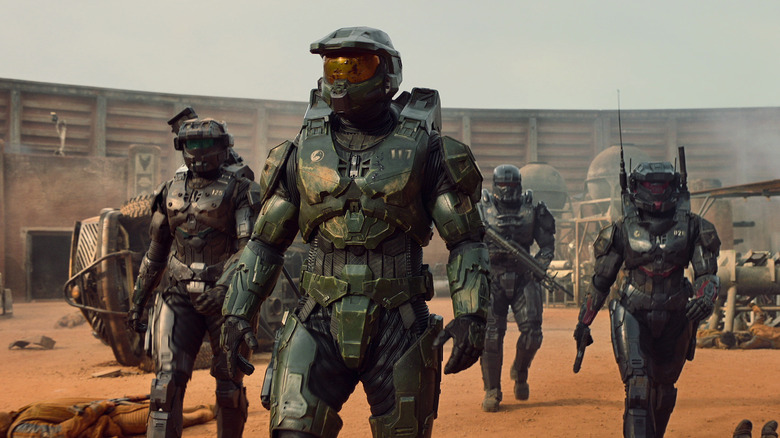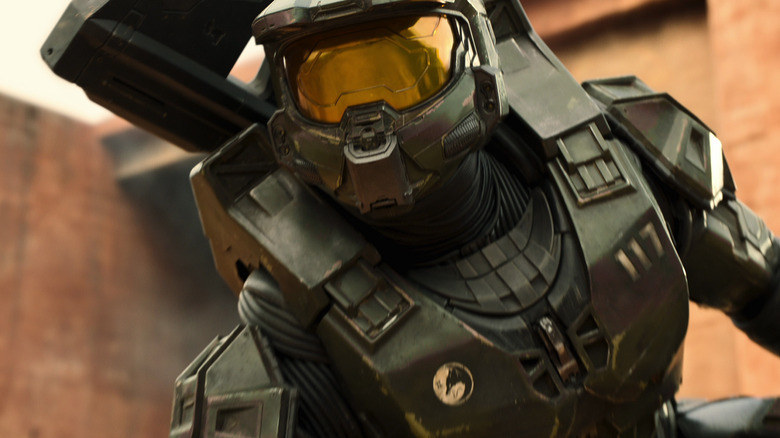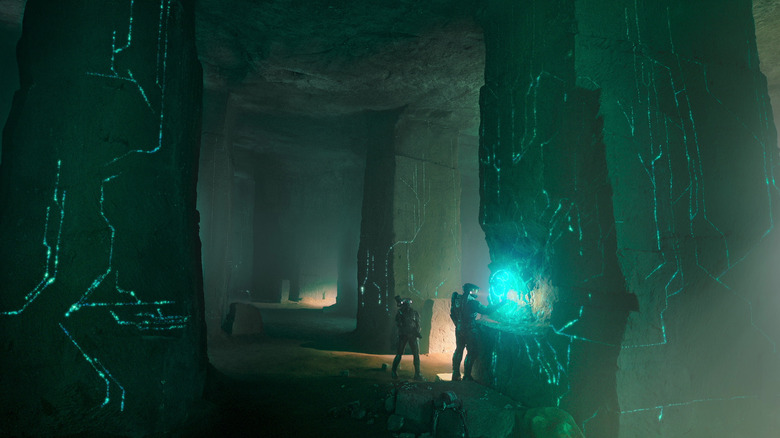
The vaunted super-soldiers of the 26th Century, known colloquially as Spartans, are called many different things by many different people: "demons" by the genocidal extraterrestrials bent on galactic destruction, "merciless killing machines" by the human insurrectionist factions currently rebelling against the all-powerful UNSC (United Nations Space Command), and "humanity's best weapon" to the masses of civilians scattered across the stars who suddenly, more than ever, need a larger-than-life war hero to give them hope.
If that sounds like a lot of pressure for any group of people to handle, even one as elite as the Spartans, that's precisely the point. The newest Paramount+ series "Halo," developed by writers and showrunners Steven Kane and Kyle Killen and based on the acclaimed video game series, makes this clear right from its opening scene. Placing viewers in the entrenched perspective of a group of insurrectionists living on the dusty Outer Colony world of Madrigal, the almost 20 minute-long prologue begins with a terse conversation about the mythical Spartans. Known only by reputation and spoken of only in whispers, the one thing most veteran rebels can state with certainty is that they certainly "aren't human." It's an intriguing choice to drop viewers, both casual and expert alike, right into the deep end by tacitly reframing the assumption of whether the beloved Master Chief/John-117 and his buddies are actually heroes or not.
This very pointed discussion about the Spartans goes on to define much of the first two episodes of "Halo," which were screened ahead of its March 24, 2022 release during this weekend's South by Southwest Film Festival. Even acknowledging such a relatively small sample size, however, the early returns would have to be considered decidedly mixed at best.
To their credit, the creative team staked their territory and announced their intentions with the release of the trailer footage, which hewed extremely faithfully to the tone and aesthetics of the video game series that fans have embraced since the 2001 release of "Halo: Combat Evolved." At the same time, many were quick to notice some major digressions, such as this version of the artificial intelligence Cortana noticeably lacking her familiar blue appearance. Video game developer and production company 343 Industries laid out all these changes (and more) ahead of time with a lengthy blog post months back, explaining the familiar-yet-distinct timeline (nicknamed "Silver," after the team of Spartans that the Master Chief leads in the series) that "Halo" will operate under. Rest assured, this series is as welcoming to franchise newcomers as it is to those who know their stuff.
As much as this raised confidence (on the page, at least) that those in charge understood that they couldn't allow pre-existing canon to restrain themselves (think back to Disney making the unambiguously correct call to free their "Star Wars" movies from the confining shackles of the "Expanded Universe," now relegated as "Legends"), and underscored that a new medium would inevitably require new storytelling adjustments, the reality is this approach of abiding as close as possible to the games aside from ... well, the entirety of the brand-new plot, gives the showrunners the appearance of trying (and failing) to have their cake and eat it too.
Ultimately, this can't help but feel symbolic of the identity crisis at the heart of the Paramount+ series in the early going — much of which comes back to the pesky problem of the Spartans and the Master Chief in particular, specifically whether to treat him as an iconic figure to be revered ... or an immensely flawed hero who needs to be brought back down to earth.
The Action Problem

For the hordes of video game fans clamoring for a property like "Halo" to receive the grand live-action treatment it deserves, the execution of the action sequences remains at the top of their list of priorities. But when it comes to taking the largely run-and-gun approach of a first-person shooter — which, by definition, relies on a critical level of interaction with players — and translating it into the more passive medium of television, obstacles quickly arise that have befallen many a video game adaptation in years past.
So where does "Halo" land on this unsightly spectrum? To tell the truth, fans may be shocked by just how little action there is in these first two episodes in the first place. What little there is, however, isn't encouraging.
The premiere, titled "Contact" and directed by filmmaker Otto Bathurst ("Black Mirror," "Peaky Blinders," "Robin Hood"), begins with that aforementioned pre-credits sequence on Madrigal. Here, we meet Kwan Ha (Yerin Ha), the rambunctious daughter of rebel leader Jin Ha (Jeong-hwan Kong), and essentially the audience stand-in of the story. When she and her friends stumble upon a Covenant invasion by the fierce alien forces of Elites (a species known as the Sangheili, if you'll let me push my glasses all the way up), what follows is a largely grounded and surprisingly gory fight to the death as the rebels unsuccessfully attempt to fend off the immeasurably superior enemy. You already know what happens next — Master Chief (played with imposing, if one-note presence by Pablo Schreiber) and the rest of Silver Team (Kate Kennedy as Kai, Bentley Kalu as Vannak, and Natasha Culzac as Riz, serviceable and unremarkable thus far) airdrop into the battlefield at the last moment and promptly show off all their super-human capabilities.
While the copious amounts of alien CGI are convincing enough and the fight choreography feels lifted right out of the game engines (regenerative shielding and melee attacks, game-accurate plasma rifles, and aerial ships!), this entire sequence unintentionally highlights the inherent restrictions of bringing material designed and created for video games into the uncanny valley of live-action. No matter how the sound design tries to sell it, neither the Spartans nor the Elites come with any actual weight or dramatic heft. We watch sequences of Spartans flipping dozens of feet into the air or Elites swiping aside vehicles with little effort in wide-angle shots that depict the action cleanly, but we're left at a physical and emotional remove from what's happening on-screen. The frequent cuts to Master Chief's helmet-view try to make up for this, but mostly come across as inconsequential references to "Halo" point-of-view gameplay footage and little else.
Worst of all, however, the shooting of this sequence highlights the discrepancy at the heart of "Halo." The Spartan reinforcements are filmed as vaguely "cool" and "badass" as possible, with the sun glinting off their impervious armor and every instance of fight choreography ending with an action figure-ready pose. But, to put it bluntly, the corny macho posturing and inauthentic feel of the set design itself (though much of the sequence would likely need to be overhauled, one can't help but wonder how The Volume and the use of projected screens may have helped) simply don't measure up to comparable scenes in, say, "The Mandalorian."
As thudding and inert as this early sequence feels, standing out all the more for being the only major set piece so far, it also evokes a sense of a show at war with itself. Through the overwhelmingly sympathetic lens of the human rebels contrasted against the downright fascistic depiction of the UNSC — an organization that orders the coldblooded murder of humans without a second's hesitation, installs puppet regimes with unsavory characters (played by the always-delightful Burn Gorman!) to exploit the resources on Madrigal and justifies it because of "lowered fuel prices," and, oh yeah, began the wildly unethical Spartan program in the first place — our loyalties are placed firmly against Master Chief's superiors, as he seeks to break free of his lifelong conditioning and regain a semblance of a conscience. Yet when the text alleges one disturbing notion regarding these genuine killing machines (the backstory connecting John-117 with Kwan Ha is appropriately tragic and unexpectedly damning), and the action shows us something else altogether, viewers will inevitably feel like they're being pulled in two separate directions.
That Pesky Plot

If the action in the first two episodes of "Halo" comes with a series of drawbacks, then the plot itself fares a little better. Rather than retreading narrative ground told elsewhere in franchise lore (like author Eric Nylund's novel "Halo: The Fall of Reach" or the video game prequel "Halo: Reach"), the Paramount+ series boldly strikes out on new ground entirely — even if the scope and scale of the story at this point seems bizarrely limited.
After arriving on Madrigal and dispatching the Covenant forces, the Master Chief encounters a mysterious object (described as a "relic" by the Covenant, a few of whom we check in on sporadically throughout the two episodes) that has an alarming effect on him when physically touched. The franchise implications for future episodes are apparent to even the most casual fan (no, there are no actual Halos in the first two hours of "Halo"), but this plot device at least allows the writing team to dive into the character's memories and upbringing.
Granted, it takes the better part of the first episode to even come close to following through on actor Pablo Schreiber's previous quotes about "crack[ing] the veneer" of John, as we finally get an interesting (if brief) exploration of how much weight he must be carrying on his shoulders (and not just the physical kind). During a conversation with Kwan about his battlefield prowess ("propaganda," as she rightfully calls it), his heavy sigh and a slight hanging of his helmeted head communicate all that needs to be said about the actual man inside the suit. Yes, the Master Chief does end up taking off his helmet and yes, it's actually the right choice as it comes at a crucial character moment for both him and Kwan. Now, if only we could get more moments like that.
The story soon places Master Chief and Kwan on the run with hardly anyone to trust, outside of an old friend nursing some grudges (Bokeem Woodbine along with his character's wife played by Fiona O'Shaughnessy, both of whom feel lifted from a different show altogether in the best possible way). But oddly enough, the first two "Halo" episodes fail to take advantage of the incredible amount of world-building on display throughout the games. We never really get a sense of just how big a threat the Covenant poses to humanity's forces on a galaxy-wide scale, let alone how many years into the conflict we actually are. And for all we know, the collective military intelligence of the human race and the larger UNSC might as well be restricted to the handful of supporting characters we follow: the duplicitous Dr. Catherine Halsey (a pitch-perfect Natascha McElhone), Admiral Margaret Parangosky (Shabana Azmi), Fleet Admiral Hood (Keir Dullea), Captain Jacob Keyes (Danny Sapani), and Miranda Keyes (Olive Gray).
But as apparent and hard to miss as these growing pains may be, the potential of the series still manages to peek through all the rookie mistakes. The reinvention of certain choice bits of established lore, mainly pertaining to Cortana and the nature of how the Master Chief will encounter the Halo ring, is sure to rile up purists, but proves those behind the wheel of this series know when to break from established tradition when the story calls for it. The dynamic between John-117 and Kwan may be familiar, but more time spent with them should help add a much-needed grounding influence on the franchise icon. And as muddled and confused as the early episodes may be with regards to how exactly to depict the Master Chief himself, the instinct to delve into his origins and shine a light on the unspeakably abhorrent actions of his superiors is absolutely the right one.
This "Halo" series isn't a one-to-one adaptation of the game by any means, which is sure to turn diehard fans away. It's not particularly successful so far at forging its own path on its own merits, either, which might not appeal to those looking for a satisfying story. But at the very least, the foundation and the good intentions exist to make up for a slow start. In his time, the Master Chief has overcome much worse odds than that.
"Halo" will debut on Thursday, March 24, 2022, on Paramount+.
Read this next: The 14 Best Sci-Fi Shows On Amazon Prime
The post Halo Review: The Video Game Adaptation Tries To Find The Humanity Beneath The Helmet appeared first on /Film.
via Ecobuynow

.png)



Don't be spammer